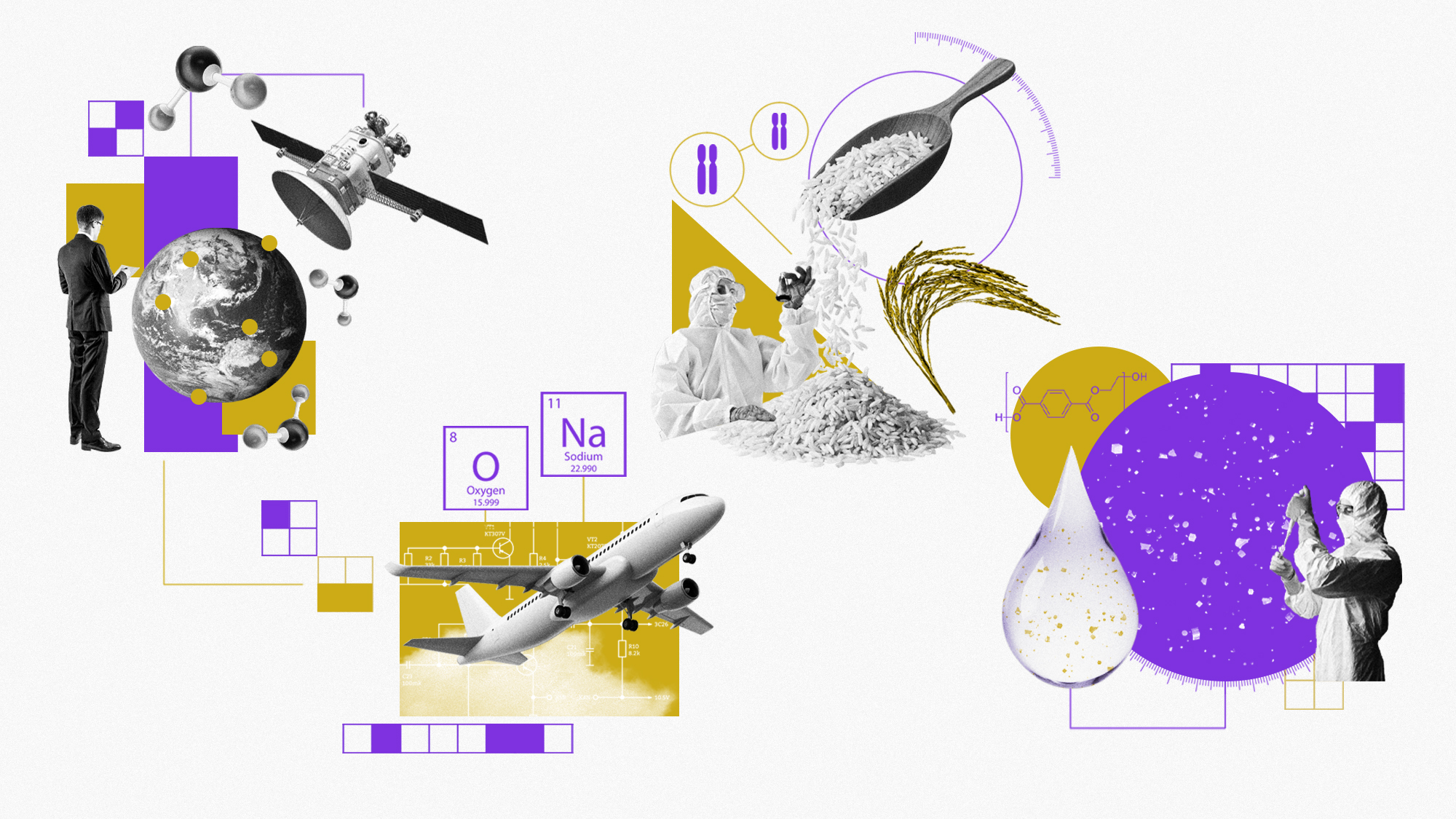An essential guide to Cop26
World leaders and demonstrators descend on Glasgow for climate summit
World leaders have been listening to a series of stark speeches at the opening ceremony of Cop26 today.
Joe Biden, Prince Charles and David Attenborough were among the speakers pushing delegates to take urgent action to tackle climate change.
“The clock is ticking to the furious rhythm of hundreds of billions of pistons and furnaces and engines with which we are pumping carbon into the air faster and faster,” Boris Johnson told his counterparts in Glasgow.
The Week
Escape your echo chamber. Get the facts behind the news, plus analysis from multiple perspectives.

Sign up for The Week's Free Newsletters
From our morning news briefing to a weekly Good News Newsletter, get the best of The Week delivered directly to your inbox.
From our morning news briefing to a weekly Good News Newsletter, get the best of The Week delivered directly to your inbox.
But the prime minister has previously said that “it’s touch and go” as to whether a deal will be struck that would commit world leaders to the Intergovernmental Committee on Climate Change’s recommendation of keeping temperature rises to no more than 1.5C, a commitment initially made in 2015 at the Cop21 conference in Paris. “We could do it,” he said, “or we could fail by the middle of November.”
The history
The Cop26 summit, which was scheduled to take place last year but delayed due to the pandemic, brings together the signatories of the UN Framework Convention on Climate Change (UNFCCC), a treaty agreed in 1994. It’s been described by the United States climate envoy John Kerry as the “last best hope for the world to get its act together” and avert the worst effects of the climate crisis.
The last conference, Cop25, was held in Madrid in November 2019, with Greta Thunberg's arrival bringing more attention to the event. While it was hoped that the meeting would “finalise the rulebook of the Paris Agreement”, the talks were “unable to reach consensus in many areas”, noted environmental news website CarbonBrief.
A free daily email with the biggest news stories of the day – and the best features from TheWeek.com
The UN Secretary General António Guterres said at the time that he was “disappointed” with the results, adding: “The international community lost an important opportunity to show increased ambition on mitigation, adaptation and finance to tackle the climate crisis.”
The UK government is hoping that Cop26, held from 31 October to 12 November, will have a better outcome.
The aim
Much of this year’s climate conference will centre on delivering goals set out in the 2015 Paris Agreement, as well as moving the UN Climate Change process forward.
The conference is “being viewed as the successor to Cop21”, the summit at which it was signed, Euronews reported. It will be used to “both address what has and hasn’t been achieved since 2015, while also setting concrete plans to reach the Paris Agreement targets”.
One of the key aims of the Paris Agreement was to limit global warming to between 1.5C and 2C by the middle of the century. The success of this goal, and others agreed in the deal, is dependent on all countries committing to “reaching net-zero emissions as soon as possible, and to significant further cuts by 2030”, according to a government report briefing in the run-up to Cop26.
The publication of the latest report from the IPCC in August has further heightened the importance of the summit’s success. More than 230 researchers estimated that global temperatures are likely to rise by 1.5C over the next 20 years, far exceeding the commitments made in 2015. Cop26 President Alok Sharma said that the report was a “wake up call for the world” on climate but stressed that “the very worst of climate change is still avoidable”.
“We need to make sure that at Cop26 we are able to credibly say we have kept 1.5C alive,” he continued, with action required “this year”.
It’s hoped that the summit will achieve these four aims:
- To mitigate the worst effects of climate change, countries will present their ambitious targets on reducing emissions by 2030, in line with the aim to meet net-zero by 2050. These plans will include accelerating the phase-out of coal burning and encouraging further investment in renewable energy.
- An agreement will be reached on adapting in order to protect ecosystems, and enabling countries impacted by climate change to build resilient infrastructure to avoid the loss of lives, livelihoods and homes.
- Developed countries are to follow through on their promise to mobilise $100bn (£73bn) in climate finance annually in order to support developing countries and secure the global net-zero goal.
- Accelerate collaborative action between governments, societies and businesses against climate change.
The attendees
Every member of the UN, as well as Palestine, the Cook Islands and Niue, is a signatory to the UNFCCC. This effectively means that every nation, country or state in the world is involved, making a total of 197 signatory parties.
It was expected that the leaders of all signatories would join the summit, as well as roughly 20,000 accredited delegates. However, the absence of China and Russia’s leaders will be notable. President Xi Jinping’s decision to address the conference in the form of a written statement rather than in person has cast further doubts over whether China will cooperate on the summit’s aims. China did, however, make a commitment in September to stop building new coal-fired power projects abroad.
The Queen will also be a no-show due to doctors’ recommendations that she continues to rest for two weeks after an overnight stay in hospital last week. There will, however, be other famous visitors in Glasgow. Hollywood stars Arnold Schwarzenegger and Matt Damon “are expected to show face”, said Scottish tabloid the Daily Record, and Greta Thunberg will also join the summit.
The teenage activist will be joining a climate march in the host city on 5 November and has encouraged Glaswegians — including bin workers and rail staff who have planned to strike over working conditions — to join the demonstration in a tweet posted last week.
Thunberg previously tweeted that she “would love to attend” Cop26, so long as “everyone can take part on the same terms”, referring to inequalities in the global rollout of Covid-19 vaccines.
At the G7 summit in June, Johnson said the UK would work to provide all unvaccinated Cop26 delegates with jabs before Cop26 to ensure they could attend. But “many remain concerned about inclusivity at the climate talk” should representatives from the global south not be in attendance, said Sky News. Richard Smith, chair of the UK Health Alliance on Climate Change, has also warned in a British Medical Journal blog post that Covid cases at the conference are “likely” despite many precautions being taken, including social distancing, test and trace, and rules around face coverings.
The situation so far...
Around 120 heads of state and government were set to take part in the summit today and tomorrow, said The Herald. They will be tasked with putting forward “high level ambition and action towards securing net zero and keeping 1.5 degrees in reach”, according to the official programme of events.
Many have been giving their opening statements today, with Johnson urging leaders to channel their inner 007. “We might not feel like James Bond, or look like James Bond, but Cop26 must be the start of defusing that bomb. Yes, it is going to be hard, but yes, we can do it,” he concluded.
The UN’s Guterres also had blunter opening message, saying “our addiction to fossil fuels is pushing humanity to the brink”.
He said the world faces a choice: “Either we stop it - or it stops us.”
Outside the Scottish Event Campus, a series of protests have been taking place across the city. Extinction Rebellion protesters at Glasgow Central Station welcomed conference delegates with large eyes and signs saying the “world’s eyes on you”.
-
 The battle over the Irish language in Northern Ireland
The battle over the Irish language in Northern IrelandUnder the Radar Popularity is soaring across Northern Ireland, but dual-language sign policies agitate division as unionists accuse nationalists of cultural erosion
-
 Villa Treville Positano: a glamorous sanctuary on the Amalfi Coast
Villa Treville Positano: a glamorous sanctuary on the Amalfi CoastThe Week Recommends Franco Zeffirelli’s former private estate is now one of Italy’s most exclusive hotels
-
 How roadkill is a surprising boon to scientific research
How roadkill is a surprising boon to scientific researchUnder the radar We can learn from animals without trapping and capturing them
-
 The world is entering an ‘era of water bankruptcy’
The world is entering an ‘era of water bankruptcy’The explainer Water might soon be more valuable than gold
-
 Climate change could lead to a reptile ‘sexpocalypse’
Climate change could lead to a reptile ‘sexpocalypse’Under the radar The gender gap has hit the animal kingdom
-
 The former largest iceberg is turning blue. It’s a bad sign.
The former largest iceberg is turning blue. It’s a bad sign.Under the radar It is quickly melting away
-
 How drones detected a deadly threat to Arctic whales
How drones detected a deadly threat to Arctic whalesUnder the radar Monitoring the sea in the air
-
 ‘Jumping genes’: how polar bears are rewiring their DNA to survive the warming Arctic
‘Jumping genes’: how polar bears are rewiring their DNA to survive the warming ArcticUnder the radar The species is adapting to warmer temperatures
-
 Environment breakthroughs of 2025
Environment breakthroughs of 2025In Depth Progress was made this year on carbon dioxide tracking, food waste upcycling, sodium batteries, microplastic monitoring and green concrete
-
 Crest falling: Mount Rainier and 4 other mountains are losing height
Crest falling: Mount Rainier and 4 other mountains are losing heightUnder the radar Its peak elevation is approximately 20 feet lower than it once was
-
 Death toll from Southeast Asia storms tops 1,000
Death toll from Southeast Asia storms tops 1,000speed read Catastrophic floods and landslides have struck Sri Lanka, Indonesia, Thailand and Malaysia